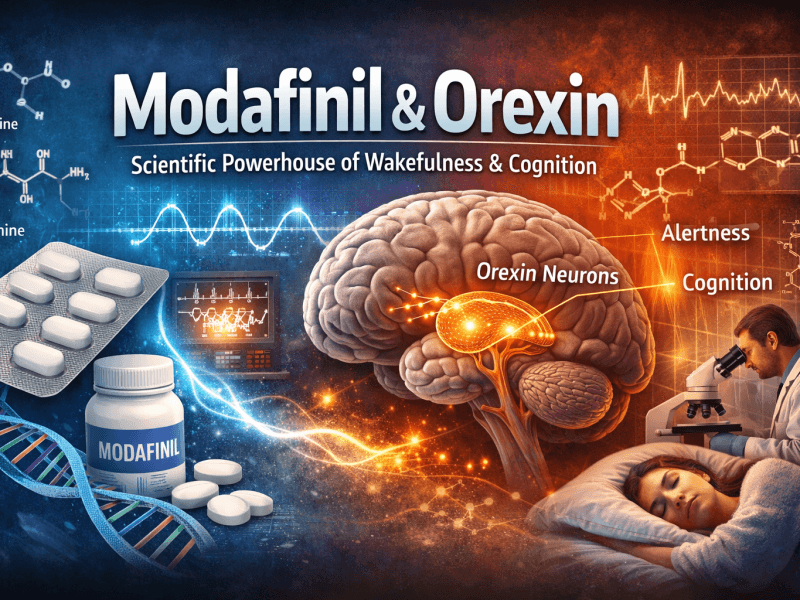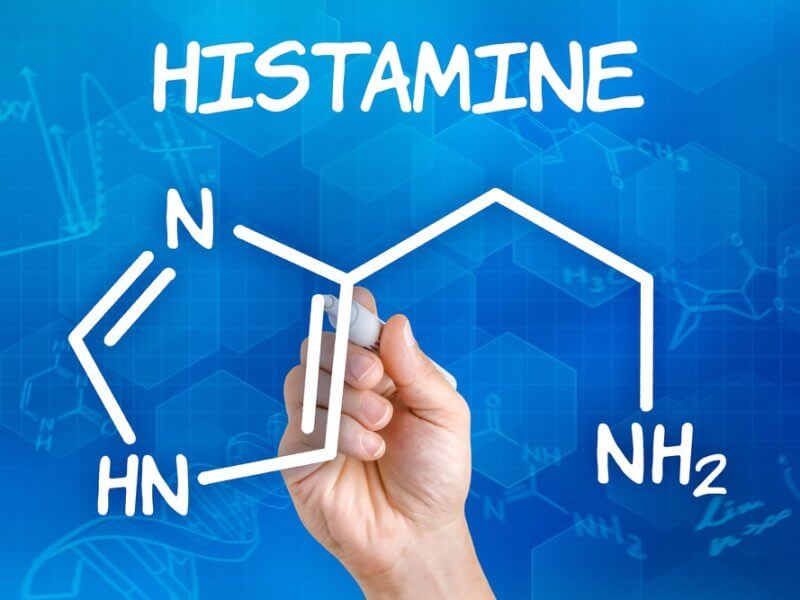Last Updated on 04/02/2026 by James Anderson
Introduction: Beyond Cognitive Enhancement
Modafinil is celebrated for its potent ability to sharpen focus and sustain wakefulness. However, its influence extends beyond the cognitive domain, directly impacting the neural circuits that govern our emotions. For a subset of users, this manifests as increased irritability, mood instability, or even aggression a critical side effect often overlooked in discussions of its benefits.
Moves past anecdotal reports to examine the precise neurobiological mechanisms that can link Modafinil to aggression. We will analyze the roles of dopamine, orexin, and GABA, identify who is most at risk, and provide an evidence-based, actionable protocol for mitigating these emotional effects. As a specialist in neuropharmacology, the goal is to equip you with a nuanced understanding that prioritizes both mental performance and emotional well-being.
The Neurochemical Nexus: How Modafinil Alters Emotional Processing
Modafinil’s primary action is not as a simple stimulant but as a complex modulator of multiple neurotransmitter systems. It is this broad-spectrum influence that underlies both its therapeutic benefits and its potential to disrupt emotional equilibrium.
- Dopamine Reuptake Inhibition: Modafinil’s most significant mechanism concerning mood is its action as a weak but selective dopamine reuptake inhibitor (DRI). By increasing extracellular dopamine in the prefrontal cortex, it enhances executive function. However, in susceptible individuals or at high doses, this can tip into overstimulation of the mesolimbic pathway, a circuit heavily involved in reward, motivation, and, crucially, aggression and impulsivity. This dysregulation can lower the threshold for frustration and hostile responses.
- Orexin (Hypocretin) System Activation: Modafinil potently activates the orexin-producing neurons in the hypothalamus. While this is central to promoting wakefulness, it also activates the sympathetic nervous system. The resulting state of heightened physiological arousal increased heart rate, alertness, and vigilance can prime the body’s “fight-or-flight” response, making one more reactive to perceived threats or irritants.
- GABA/Glutamate Imbalance: Modafinil appears to reduce the activity of GABA, the brain’s primary inhibitory neurotransmitter, while potentially increasing glutamate, the primary excitatory neurotransmitter. This shift reduces the brain’s natural “braking” capacity for emotional responses. The resultant decrease in inhibitory control can lead to emotional impulsivity, where feelings of annoyance translate more quickly to verbal or behavioral outbursts.
Clinical and Anecdotal Evidence: Mapping the Emotional Side Effect Profile
Formal clinical trials for Modafinil’s approved uses (narcolepsy, shift work disorder) often report low rates of serious aggression, but they primarily assess safety in controlled populations. The real-world picture, especially among healthy individuals using it for cognitive enhancement, is more complex.
- User-Reported Experiences: A consistent pattern emerges from forums and detailed user logs:
- Emotional Blunting: A sense of detachment or reduced empathy, often described as “robot-like” focus.
- Irritability & Impatience: A significantly lowered tolerance for interruptions, inefficiency, or social demands.
- Reactive Aggression: Snappy, hostile, or overly confrontational responses to minor provocations that would typically be ignored.
- This duality blunting paired with reactivity suggests Modafinil may not create new emotions but rather amplifies existing predispositions while simultaneously impairing top-down emotional regulation.
- High-Risk Populations: Clinical literature underscores that individuals with certain pre-existing conditions are at markedly higher risk:
- Bipolar Spectrum Disorders: Modafinil can potentially precipitate or exacerbate manic or hypomanic episodes, which frequently feature irritability and aggression.
- Anxiety Disorders: The drug’s activating effects can intensify baseline anxiety, leading to a state of hypervigilance and defensive hostility.
- ADHD with Impulsivity: While sometimes used off-label for ADHD, it may worsen impulsive traits in some individuals.
- Borderline Personality Disorder: Emotional dysregulation is a core feature, which Modafinil may significantly worsen.
A Proactive Management Protocol: Mitigating the Risk of Aggression
If you experience emotional side effects, a structured, step-by-step approach is far more effective than abrupt discontinuation or unchecked suffering.
1: Immediate Adjustments (Weeks 1-2)
- Dose Titration: Immediately reduce your dose by 50%. The difference between 200mg and 100mg (or 100mg and 50mg) can be the difference between irritability and clear-headed focus. The goal is to find the minimum effective dose.
- Cycle, Don’t Chronicle: Cease daily use. Adopt a strategic cycling protocol, such as 2-3 days on followed by 2-3 days off, or limit use to high-demand days only. This prevents cumulative effects on neurotransmitter systems.
- Hydration & Nutritional Neurology: Dehydration and low blood sugar are potent irritability amplifiers. Adhere to a strict regimen of 3+ liters of water daily and prioritize slow-release carbohydrates and protein. Consider supplementing with Magnesium L-Threonate, which supports GABA function and neuronal calming, and a high-quality Omega-3 (EPA/DHA) for neuronal membrane health.
2: Behavioral and Contextual Optimization (Weeks 3-4)
- Sleep Debt Elimination: Modafinil is not a substitute for sleep. Using it while sleep-deprived virtually guarantees emotional volatility. Ensure 7-8 hours of quality sleep on both “on” and “off” days.
- Stimulant Stack Audit: Eliminate all synergistic stimulants, most notably caffeine. The combination dramatically increases the risk of anxiety, jitteriness, and irritability.
- Mindful Scheduling: Use Modafinil for deep, solitary work. Avoid scheduling important interpersonal meetings, conflict resolution, or emotionally charged tasks during your peak effect window.
3: Advanced Monitoring and Support
- Emotion Journaling: Keep a concise log: Dose, sleep hours, and a 1-10 rating for irritability/focus. This data is invaluable for identifying personal triggers and patterns.
- Cognitive Reframing: When you feel irritability rising, consciously label it: “This is a pharmacological side effect, not a core emotion.” This simple metacognitive act can create a crucial buffer between impulse and action.
Critical Red Flags: When to Discontinue and Seek Help
Certain symptoms transcend normal side effects and warrant immediate cessation and professional consultation:
- Escalating Hostility: Verbal outbursts, physical urges, or ideation of harm towards others or yourself.
- Paranoia or Severe Anxiety: Feeling persecuted, overly suspicious of others, or experiencing panic attacks.
- Persistent Mood Swings: Rapid, uncontrollable cycling between irritability, euphoria, and depression.
- Detachment from Reality: Any experience of disassociation or psychotic-like symptoms.
Do not taper; stop immediately. These are signs of a significant adverse neuropsychiatric reaction.
FAQ
Is “Modafinil aggression” a sign of my underlying personality?
Not necessarily. While it can amplify pre-existing traits, aggression on Modafinil is primarily a pharmacologically-induced state driven by the neurochemical mechanisms described. It is a known, if uncommon, side effect of the drug’s profile.
Can supplements like L-Theanine or Ashwagandha help?
L-Theanine (200-400mg) is a well-researched option. It promotes alpha brain waves and supports GABA activity, which can take the “sharp edge” off Modafinil’s activation without sedation. Ashwagandha (KSM-66 or Sensoril extracts) may help modulate cortisol and stress response. Always consult a healthcare provider before combining supplements with any medication.
I have ADHD and Modafinil makes me irritable. Are there alternatives?
Yes. This is a clear signal the drug may not be suitable for your neurochemistry. Discuss with your doctor alternatives like Armodafinil (which has a different enantiomer profile and may be better tolerated), atomoxetine, or guanfacine, which work via non-stimulant pathways.
Conclusion: A Call for Informed and Respectful Use
Modafinil is a powerful tool, but its power extends to the emotional brain. The link between Modafinil and aggression is not mythical; it is grounded in identifiable neurochemistry and is a vital part of a comprehensive risk-benefit analysis.
Responsible use means moving beyond seeking mere stimulation. It requires adopting a holistic, self-aware protocol that respects the drug’s profound influence on both cognition and emotion. By starting low, cycling use, optimizing your physiological baseline, and vigilantly monitoring your emotional state, you can harness the cognitive benefits while safeguarding your interpersonal well-being and mental health. The most effective cognitive enhancement strategy is one that enhances your whole life, not just your output.
‼️ Disclaimer: The information provided in this article about modafinil is intended for informational purposes only and is not a substitute for professional medical consultation or recommendations. The author of the article are not responsible for any errors, omissions, or actions based on the information provided.
References:
- U.S. Food and Drug Administration. PROVIGIL. U.S. Department of Health and Human Services. https://www.accessdata.fda.gov/drugsatfda_docs/label/2015/020717s037s038lbl.pdf . 2015
- Ballon JS, Feifel D. A systematic review of modafinil: potential clinical uses and mechanisms of action. J Clin Psychiatry. 2006
- Bettendorf L, Sallanon-Moulin M, et al. Paradoxical sleep deprivation increases the content of glutamate and glutamine in rat cerebral cortex. Sleep. 1996
- Fuxe K, et al. Modafinil enhances the increase of extracellular serotonin levels induced by the antidepressant drugs fluoxetine and imipramine: a dual probe microdialysis study in awake rat. Synapse. 2005
- Mechanisms of modafinil: A review of current research. nih.gov. 2007
- PROVIGIL (modafinil) Tablets. FDA.GOV. 2010
- Oliva Ramirez A, Keenan A, Kalau O, Worthington E, Cohen L, Singh S. Prevalence and burden of multiple sclerosis-related fatigue: a systematic literature review. 2021.
- Scoriels, L., Barnett, J. H., Murray, G. K., Cherukuru, S., Fielding, M., Cheng, F., Lennox, B. R., Sahakian, B. J., & Jones, P. B. Effects of modafinil on emotional processing in first episode psychosis. https://doi.org/10.1016/j.biopsych.2010.09.043 . 2011
- Mereu, M., Bonci, A., Newman, A. H., & Tanda, G. The neurobiology of modafinil as an enhancer of cognitive performance and a potential treatment for substance use disorders. . https://doi.org/10.1007/s00213-013-3232-4 . 2013


